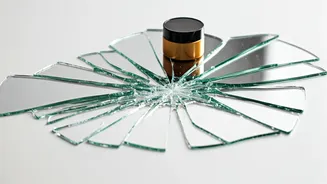Self-Diagnosis Danger
One significant red flag is the tendency to self-diagnose skin issues and then purchase products based on limited information. The appeal of online research
and readily available skincare products can be tempting. However, relying solely on these sources without professional evaluation can be detrimental. Your skin is unique, and what works for one person may not work for you. Self-diagnosis often leads to using incorrect products or treatments, potentially worsening existing conditions or causing new ones. It is always wise to consult a dermatologist or a qualified skincare expert before starting any new skincare regimen. They can accurately assess your skin type, identify underlying issues, and suggest the most appropriate and effective solutions, eliminating the guesswork and reducing the risk of adverse reactions.
Unqualified Professionals Risk
Another major concern revolves around the individuals administering skincare treatments. Getting treatments from non-experts poses a significant risk. Although various salons and spas offer skincare services, not everyone has the necessary training or qualifications. Procedures like chemical peels, laser treatments, and even certain facials require a deep understanding of skin anatomy, potential side effects, and proper techniques. Opting for treatments performed by unqualified or inadequately trained professionals may result in skin damage, scarring, or infections. Furthermore, these individuals may not be equipped to address complications that could arise. Before undergoing any treatment, always verify the qualifications and credentials of the person performing it. Research their experience, training, and any certifications. Consulting a board-certified dermatologist ensures that you receive treatments from a qualified and experienced professional, minimizing potential risks and maximizing the chances of achieving desired results.
Questionable Advice Sources
The third red flag is the reliance on skincare advice from friends, influencers, or others who are not qualified skincare professionals. Although well-intentioned, advice from these sources might not be suitable for your particular skin type or concern. Skincare recommendations found online or shared by friends are often based on personal experiences and can be highly subjective. What worked for someone else might be ineffective or even harmful for you. Social media, in particular, is flooded with skincare trends and advice, some of which may be misleading or sponsored by companies with commercial interests. Before following skincare advice from any source, carefully consider their credibility and expertise. Remember that a dermatologist or qualified skincare expert is the best resource for personalized skincare guidance, taking into account your skin's unique characteristics and requirements. They can provide evidence-based recommendations and help you navigate the complexities of skincare effectively and safely.













